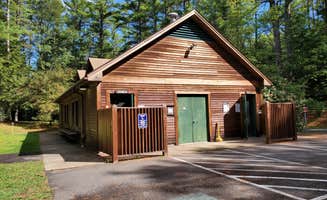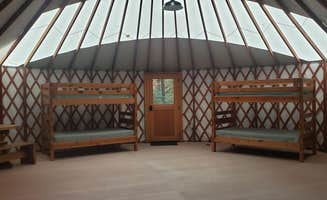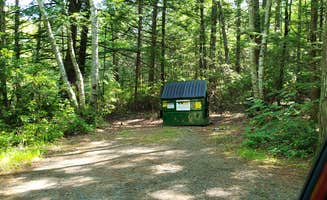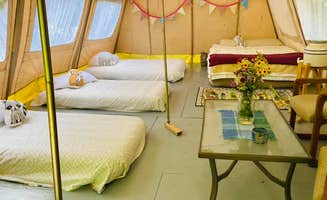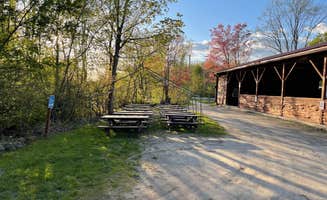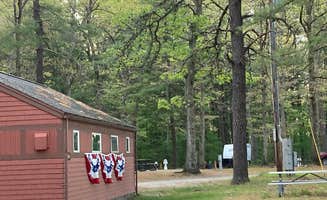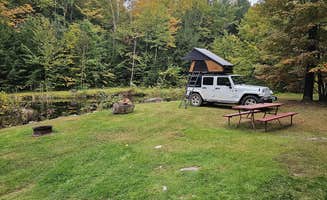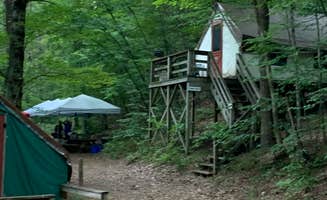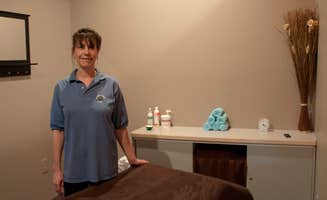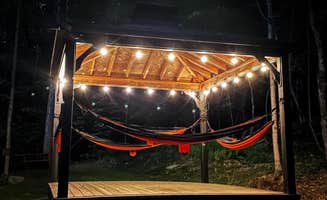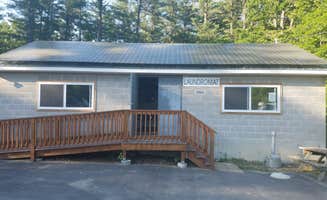Camping near Hubbardston, Massachusetts provides access to outdoor recreation in central Massachusetts's mix of hardwood forests and wetlands at elevations ranging from 800-1,300 feet. The region experiences distinct seasonal changes with warm summers reaching 80°F and winter temperatures often dropping below freezing. Campgrounds in this area typically operate from late spring through mid-fall, with most shutting down by mid-October.
What to do
Swimming options: Laurel Lake offers a public beach area for campers seeking relief from summer heat. "Swimming in a pond or a short drive to a bigger lake (camping pass covers both). One of my favorites. It's kind of a hidden gem in north central Massachusetts," notes a visitor to Otter River State Forest.
Hiking trails: The Ashuelot Rail Trail connects directly to campsites for walking and cycling. According to one reviewer at Ashuelot River Campground, "You can pick up the Ashuelot Rail Trail at the campground. They have canoes and kayaks on site, plus a shuttle service for water sports or biking."
Waterfall viewing: Several campgrounds offer access to small waterfalls and streams. At Willard Brook, visitors can explore roadside falls, while Wells State Park provides "hiking, biking, swimming, and fishing. Great little swimming lake as well as a popular hiking trail."
Paddling excursions: Many area lakes permit canoeing and kayaking, with rentals available at select campgrounds. "I went with a group of 4 in mid-July. The campground was clean and well-maintained," reports one camper about their experience at Otter River State Forest.
What campers like
Private waterfront sites: Several campgrounds offer sites adjacent to water features. At Sutton Falls Camping Area, one visitor shares, "We were delighted when we learned we had the little peninsula of site P1 all to ourselves. Stunning views across the large pond, and serving as a wonderful halfway rest/respite on the journey from NYC to Belfast, ME."
Quiet, family-friendly atmosphere: Many campgrounds maintain a peaceful environment with enforced quiet hours. According to a camper at Willard Brook State Forest, "Sites are largely level, around a small, bisected loop with towering pines. Most of the sites are best suited to tents and small trailers (think teardrops and pop-ups)."
Clean facilities: Campground bathrooms receive regular maintenance. "The new bathrooms are great!" mentions a camper at George Washington State Campground, while another notes, "Grounds were well kept, bathrooms were very clean with hot showers (bring quarters, $1.50 for 6mins)."
Fishing opportunities: Many campgrounds provide access to stocked fishing ponds. "There's a nice beach for children. The water was warm and clean. You can kayak or canoe. The dogs cannot go on the beach, but they can go in the boats," reports a visitor to George Washington State Campground.
What you should know
Varying cell service: Connectivity differs widely across the region. At Sutton Falls Camping Area, a camper reports, "Without our antenna we we only had 1 bar of both Verizon and AT&T. No signal at all on T-Mobile/Sprint." Another camper at Erving State Forest warns about "zero cell service (there is an operational pay phone at the showers)."
Non-resident fees: Several state parks charge significantly higher rates for out-of-state visitors. "Fees in 2020 are only $17 for MA residents, but $55 for out-of-staters," notes a camper at Erving State Forest Campground.
Site size limitations: Many campgrounds have limited space for larger setups. A reviewer at Wells State Park notes, "yes you will hear the road so plan accordingly and not all sites are level," suggesting careful site selection based on equipment needs.
Seasonal operations: Most campgrounds close during winter months. Operating seasons typically run from May through October, with some facilities like Willard Brook operating only from "late May to early September."
Tips for camping with families
Book beach-adjacent sites: For easier supervision of children swimming. "Sites that are near the small pond are generally larger and have better space for pitching a tent," advises a visitor at Otter River State Forest.
Look for playground access: Several campgrounds feature play equipment for children. At The Pine Campground, a visitor mentions, "Our site was across from the playground, and backed up to a stream. Playground was a bit older but it was maintained well, and the kids had fun."
Consider seasonal activities: Fall foliage viewing adds visual interest for family trips. One camper at Wells State Park notes, "It is absolutely lovely in the fall, especially on the water at the campers' beach. Quite calm and scenic."
Check bathroom facilities: Comfort stations vary widely across campgrounds. "New HUGE bathrooms!" exclaims a visitor to Wells State Park Campground, while another camper notes that older facilities can be less appealing for children.
Tips from RVers
Understand access limitations: Some campgrounds have narrow roads or covered bridges. At Sutton Falls, "There's a covered bridge that scared me a little due to size concerns but its quite tall and wide enough. Our rig is 11'9" to the top of the A/C and we had no issues."
Check site lengths carefully: Many older campgrounds have limited space for larger units. A visitor to Willard Brook notes, "a couple of sites can accommodate slightly larger units. They are level and there's not a lot of brush between sites."
Consider power requirements: Older campgrounds may offer limited amperage. Otter River provides "electric-hookups, fifty-amp-hookups, thirty-amp-hookups" according to their amenities list, making it suitable for most RV electrical needs.
Look for dump station access: Not all campgrounds offer on-site dumping. "Dump station and additional swimming/water activities are a little farther down the road at Lake Dennison," notes one Otter River visitor about facility locations.


